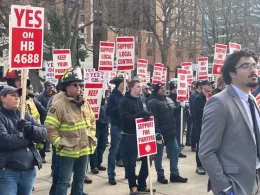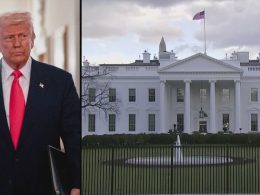LANSING, Mich. – Michigan lawmakers have introduced a bipartisan initiative aimed at reducing violent crime rates in the state, which has been identified by the FBI as home to four of the 20 most violent cities in the nation. The proposed plan, unveiled Thursday, seeks to allocate a portion of state sales tax revenue to create a Public Safety and Violence Prevention Trust Fund, designed to bolster public safety efforts in communities across Michigan.
At the forefront of the initiative is Representative Alabas Farhat (D-Dearborn), who emphasized the importance of putting aside partisan differences to address the pressing issue of violent crime. “This is the perfect way to accomplish big things for Michigan,” Farhat said during a press conference with law enforcement officials and community advocates. “Our goal is simple: to make Michiganders feel safe in their neighborhoods once again.”
The Trust Fund would provide financial support to law enforcement agencies and community violence intervention groups, ensuring they have the necessary resources and equipment to curb crime. One of the key objectives of the plan is to reduce recidivism rates, which have been a persistent challenge in many areas.
However, Farhat made it clear that the fund would not be a “blank check” for cities and municipalities. In a bid to ensure accountability, the plan includes stipulations that funding will be contingent on measurable results. “We’re going to trust our local leaders, who are closest to the pain and the issues, to get results,” Farhat stated. “If cities fail to meet our standards, we will take away funding and reallocate it to those that are showing progress.”
State Representative Mike Harris (R-Clarkston) echoed this sentiment, underscoring the urgency of the situation. “These bills are about neighborhoods struggling with violence, police departments grappling with staffing shortages, and making real, tangible improvements right now,” Harris said. “This plan will make a real difference in our communities.”
The proposed legislation is the result of months of collaboration and includes 19 drafts of the plan so far. Supporters hope that if successful, the initiative could not only benefit Michigan but serve as a model for other states facing similar challenges. The bipartisan nature of the proposal has been heralded as a step toward unified action on an issue that affects communities across political lines.
As Michigan moves forward with this plan, the state’s residents are watching closely to see if this new approach can bring the meaningful change needed to reduce violent crime and restore safety to Michigan’s cities.












